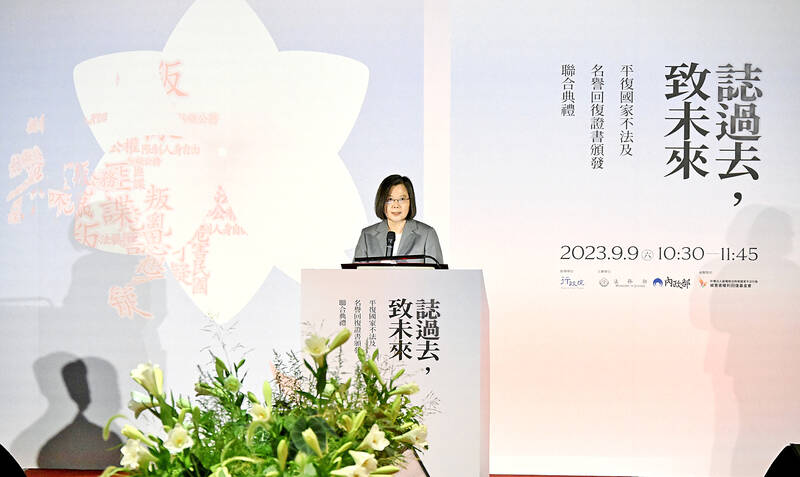President Tsai Ing-wen (蔡英文) yesterday presented certificates to restore the reputation of victims of the state during the nation’s authoritarian period.
It was the first national-level ceremony ever held to redress the state’s wrongs, Tsai said.
“Taiwan is already a democratic and free nation, so it needs to face the past authoritarian rule through transitional justice, and it must clarify the relevant responsibilities regarding the illegal acts of the state, to allow the historical truth to become clearer,” she said at an exoneration ceremony in Taipei.

Photo: George Tsorng, Taipei Times
The Act on Promoting Transitional Justice (促進轉型正義條例) was passed in 2017 and the Transitional Justice Promotion Committee was established to oversee related operations, Tsai said, adding that while the committee closed its doors last year, its work addressing transitional justice would continue to be carried out by the Executive Yuan’s six ministries.
The Ministry of Justice has redressed 1,439 wrongful judicial and administrative acts, and the Restoration of Victims’ Rights Infringed by Illegal Acts of the State During the Period of Authoritarian Rule Foundation was founded by the Ministry of the Interior in January, Tsai said.
The foundation has accepted 1,594 claims for compensation, and a total of NT$2.2 billion (US$68.73 million) has been granted to victims. It has also approved 1,439 exoneration applications and handed over the exoneration certificates at yesterday’s ceremony.
During the ceremony, which was attended by about 100 White Terror victims and their family members, Tsai also paid special tribute to late political prisoner and human rights advocate Tsai Kun-lin (蔡焜霖).
It is “regrettable that Tsai Kun-lin could not be here today, but his spirit and legacy will continue to guide us on the path of protecting Taiwan’s democracy,” Tsai said of the 92-year-old who passed away on Sunday last week, after a short stay in a hospital.
Tsai Kun-lin was among the first batch of political prisoners sent to a labor reform camp on Green Island (綠島), where he spent 10 years, the president said.
Yet his time in prison did not “devour” him, she said, adding that after his release, he founded a magazine, supported a youth baseball team and took part in activities promoting human rights.
Tsai Kun-lin was charged with treason as a 20-year-old civil servant by the then-Chinese Nationalist Party (KMT) government for joining a “left-leaning” reading club in high school.
After his release in 1960, he married and worked in advertising, later moving into publishing and founding the Prince children’s magazine in 1966. In 1968, he used the magazine to solicit donations for the Taitung Red Leaves youth baseball team, whose victory over a Japanese team was credited with sparking the nation’s interest in baseball.
In his later years, Tsai Kun-lin devoted himself to the promotion of human rights and sharing the history of the White Terror era.
Tsai Kun-lin’s son, Tsai Yen-lung (蔡炎龍), a mathematics professor, received the certificate of exoneration on behalf of his father from the president, and read out an unfinished speech his father had prepared to deliver at the ceremony.
His father hoped that future generations would not repeat history, Tsai Yen-lung said.
Apart from Tsai Kun-lin, writer and human rights advocate Lu Chien-hsing (呂建興) also received a certificate, which he said served as consolation to the victims and their families.
Describing the work of transitional justice as “a race against time,” Lu urged the government to “speed up” efforts to restore the reputation of people who were politically persecuted during the White Terror era and award compensation to victims and their surviving relatives.
Lu was arrested and given a life sentence when he was 19 years old for his involvement in student activism. He was released after serving 15 years in prison.

POSITIVE DEVELOPMENT: Japan and the US are expected to hold in-depth discussions on Taiwan-related issues during the meeting next month, Japanese sources said The holding of a Japan-US leaders’ meeting ahead of US President Donald Trump’s visit to China is positive news for Taiwan, former Japan-Taiwan Exchange Association representative Hiroyasu Izumi said yesterday. After the Liberal Democratic Party’s landslide victory in Japan’s House of Representatives election, Japanese Prime Minister Sanae Takaichi is scheduled to visit the US next month, where she is to meet with Trump ahead of the US president’s planned visit to China from March 31 to April 2 for a meeting with Chinese President Xi Jinping (習近平). Japan and the US are expected to hold in-depth discussions on Taiwan-related issues during the

‘LIKE-MINDED PARTNER’: Tako van Popta said it would be inappropriate to delay signing the deal with Taiwan because of China, adding he would promote the issue Canadian senators have stressed Taiwan’s importance for international trade and expressed enthusiasm for ensuring the Taiwan-Canada trade cooperation framework agreement is implemented this year. Representative to Canada Harry Tseng (曾厚仁) in an interview with the Central News Agency (CNA) said he was increasingly uneasy about Ottawa’s delays in signing the agreement, especially as Ottawa has warmed toward Beijing. There are “no negotiations left. Not only [is it] initialed, we have three versions of the text ready: English, French and Mandarin,” Tseng said. “That tells you how close we are to the final signature.” Tseng said that he hoped Canadian Prime Minister Mark Carney

President William Lai (賴清德) yesterday bestowed one of Taiwan’s highest honors on Saint Vincent and the Grenadines (SVG) Ambassador Andrea Clare Bowman in recognition of her contributions to bilateral ties. “By conferring the Order of Brilliant Star with Grand Cordon on Ambassador Bowman today, I want to sincerely thank her, on behalf of the Taiwanese people, for her outstanding contribution to deepening diplomatic ties between Taiwan and SVG,” Lai said at a ceremony held at the Presidential Office in Taipei. He noted that Bowman became SVG’s first ambassador to Taiwan in 2019 and

A man walks past elementary school artworks at the Taipei Lantern Festival in Ximen District yesterday, the first day of the event. The festival is to run from 5pm to 10pm through March 15.